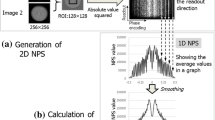Abstract
Compressive sampling has been commonly employed in the field of magnetic resonance imaging (MRI) to accurately reconstruct sparse and compressive signals. In MRI acquisition, a large amount of encoded information focuses on the origin of the k-space. With a fixed compression ratio: (a) in the traditional random under-sampling approach, the sampled horizontal lines in the binary mask are completely based on the power law; (b) in the proposed hybrid random under-sampling approach, the total number of sampled horizontal lines is divided into two parts, the large first part is still based on the power law, while the small other part is enhanced with the remaining lines which are near the origin of k-space. Because the amount of encoded information is concentrated at the origin of the k-space, the proposed method suggests that the amount of useful information will be collected more and therefore the MRI image recovery will be more accurate. The numerical simulation consequences pointed out that the average error of the appointed scheme decreased by 17.78%, compared to the traditional scheme.
Access this chapter
Tax calculation will be finalised at checkout
Purchases are for personal use only
Similar content being viewed by others
References
Candes E, Romberg J, Tao T (2006) Robust uncertainty principles: exact signal reconstruction from highly incomplete frequency information. IEEE Trans Inf Theory 52:489–509
Donoho D (2006) Compressed sensing. IEEE Trans Inf Theory 52:1289–1306
Tropp J, Gilbert A (2007) Signal recovery from random measurements via orthogonal matching pursuit. IEEE Trans Inf Theory 53:4655–4666
Lustig M, Donoho D, Pauly JM (2007) Sparse MRI: the application of compressed sensing for rapid MR imaging. Magn Reson Med 58:1182–1195
Van Phong D et al (2011) Fast image acquisition in magnetic resonance imaging by chaotic compressed sensing. In: 2011 IEEE international symposium on biomedical imaging: from nano to macro. IEEE
Tan TD et al (2010) Accelerated parallel magnetic resonance imaging with multi-channel chaotic compressed sensing. In: The 2010 international conference on advanced technologies for communications. IEEE
Candes E, Romberg J (2007) Sparsity and incoherence in compressive sampling. Inverse Prob 23:969–985
Haldar JP, Hernando D, Liang Z-P (2011) Compressed-sensing MRI with random encoding. IEEE Trans Med Imaging 30(4):893–903
Lustig M, Donoho DL, Santos JM, Pauly JM (2008) Compressed sensing MRI. IEEE Signal Process Mag 25(2):72
Author information
Authors and Affiliations
Corresponding author
Editor information
Editors and Affiliations
Rights and permissions
Copyright information
© 2020 Springer Nature Singapore Pte Ltd.
About this paper
Cite this paper
Nguyen, T.V., Huy, T.Q., Nguyen, V.D., Thu, N.T., Anh, G.Q., Tan, T.D. (2020). Hybrid Random Under-Sampling Approach in MRI Compressed Sensing. In: Solanki, V., Hoang, M., Lu, Z., Pattnaik, P. (eds) Intelligent Computing in Engineering. Advances in Intelligent Systems and Computing, vol 1125. Springer, Singapore. https://doi.org/10.1007/978-981-15-2780-7_99
Download citation
DOI: https://doi.org/10.1007/978-981-15-2780-7_99
Published:
Publisher Name: Springer, Singapore
Print ISBN: 978-981-15-2779-1
Online ISBN: 978-981-15-2780-7
eBook Packages: Intelligent Technologies and RoboticsIntelligent Technologies and Robotics (R0)




